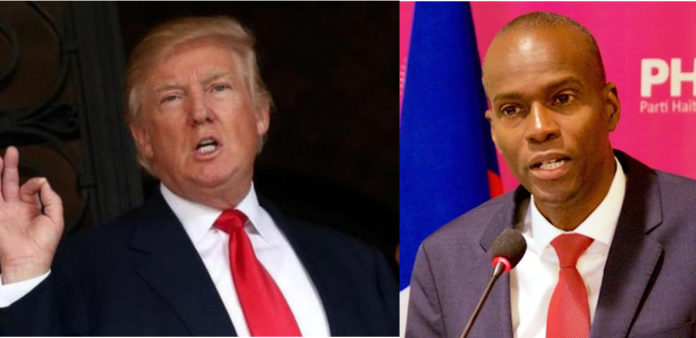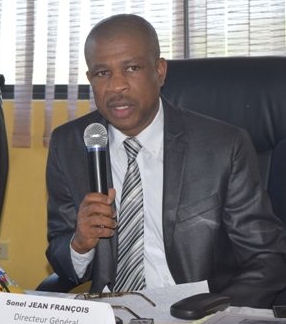
On May 9, U.S. President Donald Trump fired Federal Bureau of Investigation (FBI) Director James Comey. The president immediately came under heavy criticism, accused of obstructing justice, as the FBI is currently investigating the Trump campaign’s ties to Russia. Two weeks earlier, in Haiti, President Jovenel Moïse tried to fire Sonel Jean-François, the director of the country’s financial crimes unit (UCREF). During last year’s elections in Haiti, UCREF produced an investigative report on Moïse, raising questions of possible money laundering. No charges have been brought, but the investigation appears to be ongoing.
While Trump’s moves have spurred increasing calls for impeachment ― and the appointment of former FBI Director Robert Mueller as a special counsel to oversee the Russia probe ― in Haiti, President Moïse’s action received scant international attention.
Local human rights groups, however, have sounded the alarm. Unlike in the U.S., where the president actually has the power to fire the head of the FBI, the Haitian president had no such legal authority to fire the UCREF director. And so, for the time being, Jean-François remains in his post and met with the visiting UN Security Council delegation to Haiti on Jun. 23.
The UCREF has received millions of dollars in international support for years, much of it from the United States, however has failed to produce many measurable successes. In 2016, the State Department reported: “The country’s financial intelligence unit (FIU), the UCREF, has continued to build its internal capabilities and to do effective casework. The UCREF has 15 open cases but has not forwarded any cases to the judiciary in 2015. Continued issues in the judicial sector mean the UCREF’s progress is not yet reflected in conviction rates.”

In recent years, Haiti has come under pressure from the Caribbean Financial Action Task Force (CFATF) to make improvements to its safeguards against money laundering. If improvements are not made, CFATF has threatened to recommend member states impose restrictions on banking transactions with Haiti. Moïse took office on Feb. 7, 2017 already under a cloud of suspicion for his own alleged involvement in money laundering. Moïse’s ham-fisted attempt to yank UCREF’s independence will likely only further damage his credibility, with potentially serious economic consequences.
In early May, the Haitian Parliament approved a new law on the UCREF. Previously, UCREF’s director general was selected in a process directed by five representatives from independent bodies. The new law reportedly gives the president the ability to approve three of the five representatives, assuring the executive de facto control over the entity.
But Moïse didn’t even wait for the new law’s approval to act. On Apr. 19, he tried to replace Jean-François, just one year into a three-year term. The replacement picked by Moïse, economist and former Central Bank governor Fritz Jean, was supposed to be installed on May 11, but the nominee had “reservations” about the process, and it was scuttled. Nonetheless, Moïse claimed in a Jun. 14 Radio Caraïbes interview that Jean-François was “irregularly nominated” by former interim President Jocelerme Privert in 2016 and eventually would be replaced.
Maxime Rony of the Platform of Haitian Human Rights Organizations told the media that Moïse’s fledgling presidency was based on a “governance of revenge,” noting that, in addition to the new law on the UCREF, one of the first acts of the new Parliament ― controlled by Moïse’s allies ― was to pass a harsh defamation law. Haiti’s largest newspaper, Le Nouvelliste, wrote that since the UCREF report was released last year, its director had been “in the sights” of Moïse and his political allies.
Pierre Espérance of the National Human Rights Defense Network (RNDDH) pointed out that the law governing the UCREF outlines a clear process for selecting a new director general, and that Moïse’s decision was “contrary to the law,” and “an extremely serious matter.”
Some parliamentarians, even some previously close to Moïse, have raised their voices in opposition, but there appears to be little serious resistance to Moïse’s agenda within Parliament. Elected in a process tainted by violence and fraud ― and without safeguards against candidates with criminal records ― many within Haiti’s Parliament are themselves the subject of money laundering and drug trafficking allegations.
One of Parliament’s first acts was to approve a resolution condemning the Jan. 5 arrest and extradition of notorious paramilitary leader Guy Philippe, who had been elected but not sworn in as a Senator, to the U.S. to face drug trafficking and money laundering charges. In a blow to parliamentarians who defended Philippe as the target of a witch-hunt, Philippe pled guilty to the charges and was sentenced to nine years in Federal prison on Jun. 21. Moïse openly campaigned with Philippe during his run for the presidency.
In another move decried by the human rights community, the Haitian government has ended regular UN human rights monitoring of the country. Though the government initially pledged to replace the UN human rights expert with a domestic entity, there is no indication that will actually occur.
Together with the law on defamation and the threats to UCREF’s independence, the Haitian Parliament has acted swiftly to protect themselves ― and the president ― from needed oversight.
There is clearly some level of international concern with Moïse’s recent moves as indicated by the UN Security Council’s meeting with Jean-François last month. But with Trump taking a page out of Haiti’s presidential playbook, Moïse will be able to (correctly) point out the hypocrisy of the U.S. if it criticizes his actions.
Jake Johnston writes for the Haiti: Relief and Reconstruction Watch blog of the Center for Economic and Policy Research (CEPR). An earlier version of this article was published there in May.









